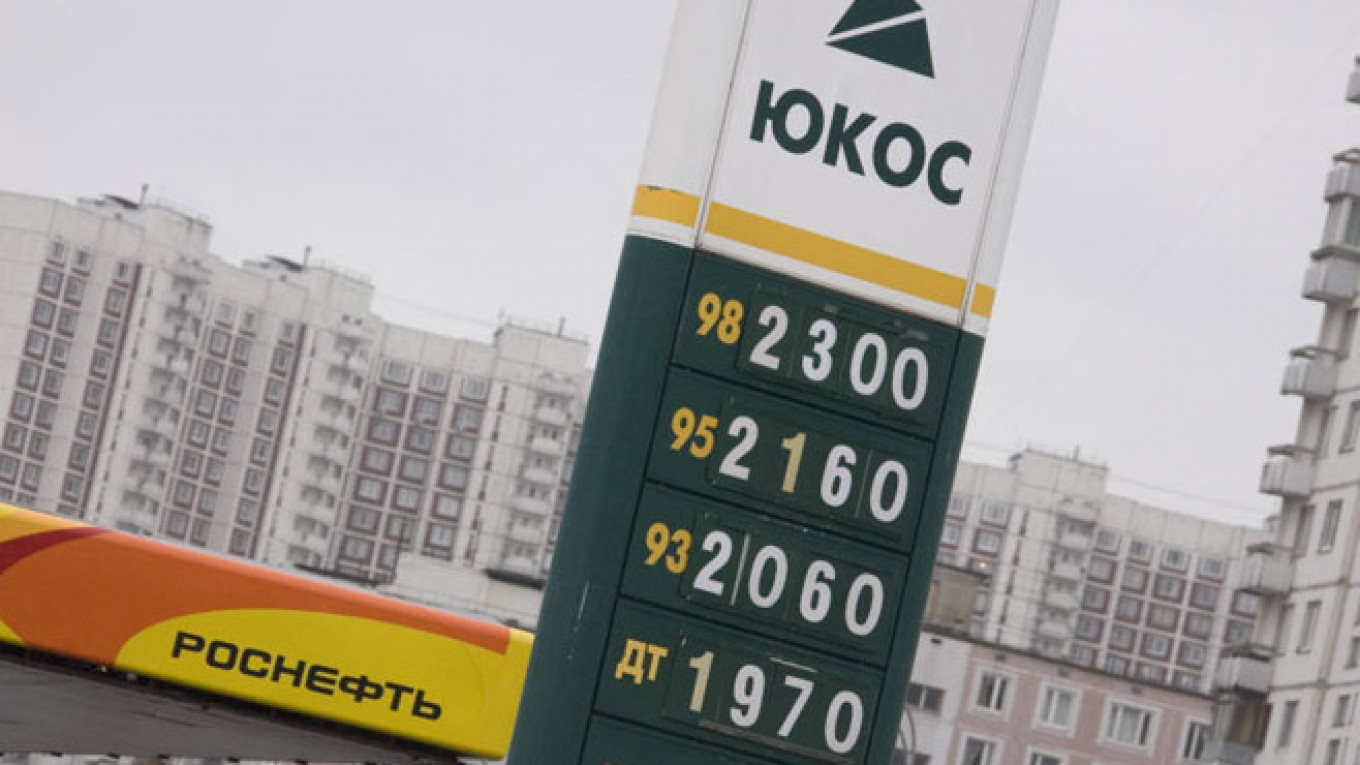The European Court of Human Rights awarded the shareholders of defunct oil giant Yukos $2.6 billion in compensation Thursday, a ruling that has left political and legal analysts split about its significance for Russia's relations with the West.
Handed down at the height of tensions between Russia and the West over the crisis in Ukraine, the Strasbourg court's ruling comes on the heels of The Hague arbitration court's order Monday that Russia pay Yukos shareholders $50 billion in compensation by Jan. 15, 2015.
The oil company was bankrupted by multibillion-dollar back-tax claims that the company's owners maintain were politically motivated.
The ECHR ruled that the penalties imposed on the company through tax proceedings that stripped it of 300 billion rubles in 2004 and 2005 were "unlawful" and that Russian authorities had "failed to strike a fair balance" in their dealings with the company. The ECHR purported that the "disproportionate character" of the enforcement proceedings had catalyzed the company's liquidation.
Russia said it would appeal the award, with the Justice Ministry rejecting the ruling as an unfair and inequitable approach to the case and saying that the amounts awarded in compensation should not have been determined by the Strasbourg-based court, ITAR-Tass reported. It said earlier it would also appeal the arbitration court's ruling.
The timing of the ECHR and Hague arbitration court rulings, as well as the vertiginous amounts of compensation won by Yukos shareholders — the ECHR ruling is the biggest compensation award in the court's history — have sparked speculation that the rulings were molded by politics.
"I think the ruling of the European Court of Human Rights is politicized," said Alexander Nadmitov, managing partner at Nadmitov, Ivanov & Partners, a prominent Russian law firm. "There might have been procedural violations during the [original Yukos] case but the decision seems to be tainted by politics given the unprecedented size of the awarded compensation. It now puts in question Russia's participation in the Council of Europe."
Senator Konstantin Dobrynin, who serves as the deputy chairman of the Federation Council's Committee on Constitutional Legislation, called on Russia to reconsider its international treaty obligations for their compliance with domestic legislation in the aftermath of The Hague's ruling. But Dobrynin also downplayed the notion that the ruling against Russia was connected to the "quality of Dutch justice and the negative political environment" at the time of the decision, saying it was more a reflection of the work of the legal consultants representing Russia's interests.
The downing of Flight MH17 over Ukraine's Donetsk region earlier this month has envenomed Russia's relations with the West, and especially the Netherlands, which lost 193 citizens in the catastrophe.
Western governments believe the plane was shot down by pro-Russia rebels in eastern Ukraine whom the West suspects Moscow of supporting.
Mikhail Khodorkovsky, the former head of Yukos who served 10 years in a Russian prison on fraud charges widely considered to have been politically motivated, told Dozhd television Thursday that he did not see any politics in the timing of the court decisions.
"If this is a coincidence, then it is completely man-made, as the Russian government itself has attempted to delay the decision of the Hague court for at least the last year," Khodorkovsky said. "The same is true of the European Court of Human Rights: The decision was made a long time ago, but the government authorities were trying to protract the announcement of the final decision for as long as possible."
Political analysts said the timing of the ECHR's ruling should not be interpreted as a signal that the Kremlin will have to pay for its disregard for the rule of law and human rights.
"The European Court of Human Rights' ruling is of course a major event, but we cannot say that this is its first decision against Russia, a first manifestation of the court's position on the situation in the country," said Maria Lipman, a scholar at the Carnegie Moscow Center, an independent think tank.
"And at the time of those [earlier] decisions, we could not say that all was well in relations between Russia and the West."
The ECHR has dealt with 257 admissible cases from Russia and delivered 129 rulings, 119 of which found at least one violation of the European Convention on Human Rights.
The cases have involved several high-profile claims against Russia, including that of Khodorkovsky and his business partner Platon Lebedev, as well as that of opposition leader Garry Kasparov.
The ECHR's latest ruling against Russia orders it to pay 300,000 euros to the Yukos International Foundation and to produce a plan within six months of the final decision on how shareholders will be compensated.
See also:
European Court Orders Russia to Pay Yukos Shareholders $2.6 Billion
Contact the author at g.tetraultfarber@imedia.ru
A Message from The Moscow Times:
Dear readers,
We are facing unprecedented challenges. Russia's Prosecutor General's Office has designated The Moscow Times as an "undesirable" organization, criminalizing our work and putting our staff at risk of prosecution. This follows our earlier unjust labeling as a "foreign agent."
These actions are direct attempts to silence independent journalism in Russia. The authorities claim our work "discredits the decisions of the Russian leadership." We see things differently: we strive to provide accurate, unbiased reporting on Russia.
We, the journalists of The Moscow Times, refuse to be silenced. But to continue our work, we need your help.
Your support, no matter how small, makes a world of difference. If you can, please support us monthly starting from just $2. It's quick to set up, and every contribution makes a significant impact.
By supporting The Moscow Times, you're defending open, independent journalism in the face of repression. Thank you for standing with us.
Remind me later.






